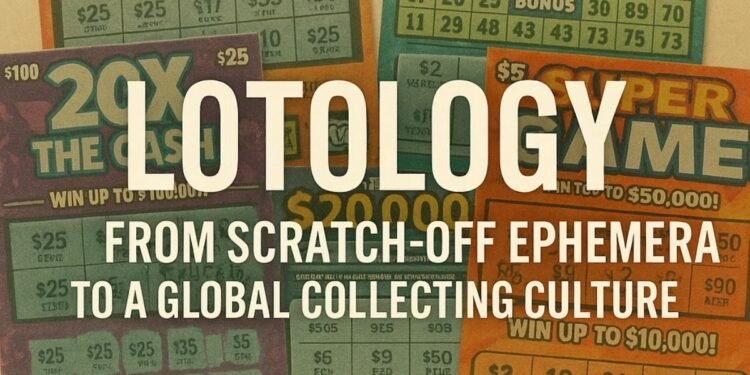Lotology: Understanding the Fascinating Science of Lotteries

Lotteries have captivated human imagination for centuries, from the simple lottery games in ancient civilizations to the multi-billion-dollar jackpot draws we see today. While many view them as a form of entertainment, lotology is a science in itself, one that studies the complexities of lottery games, their probabilities, and the psychology behind why people play them. In this article, we will dive deep into what lotology is, how it works, and why it continues to be an enduring part of human culture.
What is Lotology?
Lotology is a relatively new and niche field of study that revolves around the analysis of lotteries and the behavior of participants. The term itself is a combination of the word “lottery” and the suffix “-ology,” which signifies the study of a particular subject. At its core, lotology examines the mathematical and psychological aspects of lottery systems, including probability, odds, and the factors that drive people to play.
Though often dismissed as mere games of chance, lottery systems are designed with intricate mathematical principles that govern the outcomes. Lotologists explore these systems by applying probability theories, analyzing patterns, and researching human tendencies. Whether it’s understanding the impact of “lucky numbers” or uncovering how lottery companies design their games, lotology aims to shed light on the mystery behind this widely popular form of gambling.
The Mathematics Behind Lotteries: Probability and Odds
When we think of a lottery, the first thing that comes to mind is the idea of winning a massive sum of money. But, as most players know, the odds of winning are incredibly slim. In fact, the odds are usually so low that the chances of hitting the jackpot are almost negligible. This is where the science of lotology comes into play.
Lotologists apply probability theory to analyze how lottery games are structured and what the odds are of winning. For instance, in a typical 6/49 lottery, players select six numbers from a pool of 49 numbers. The total number of possible combinations can be calculated using a formula called the combination formula, which results in a staggering figure of 13,983,816 possible combinations. This means that, on average, you have just a 1 in 13.9 million chance of winning the jackpot.
But the mathematics of lotteries doesn’t end there. Lotologists also study the payout structure, ensuring that the odds of winning align with the prize pool. By using complex algorithms and simulations, they can predict how the jackpot will grow, how much a typical winner will receive, and how the odds can be manipulated to create larger, more enticing prizes.
How Do Lotteries Ensure Fairness?
One of the most important aspects of lotology is ensuring that lottery systems remain fair and transparent. Lotteries are heavily regulated by government agencies to make sure they are not rigged or manipulated. Lotologists study the randomness of the draw and the security measures in place to prevent fraud.
Lotteries are designed to produce random outcomes, and there are different ways to achieve this. Mechanical ball machines, for example, use physical balls that are drawn at random, while electronic systems rely on random number generators (RNGs) to select the winning numbers. Lotologists examine how these systems are tested for fairness, looking for ways to improve the accuracy and reliability of these randomization methods.
The Psychology of Lottery Players: Why Do We Play?
While the mathematical side of lotology is fascinating, the psychological aspect is equally intriguing. People are naturally drawn to the possibility of winning large sums of money, but what makes the lottery so irresistible even when the odds are so stacked against us?
The Illusion of Control
One key psychological concept that lotologists explore is the illusion of control. This is the idea that people believe they have more control over an outcome than they actually do. When it comes to lotteries, players often choose their own numbers, thinking that certain numbers are luckier than others. They may even believe that certain patterns or sequences increase their chances of winning, despite the fact that lottery draws are entirely random.
This illusion of control plays a significant role in the decision to play, as people feel that their actions—whether it’s selecting a personal number or playing regularly—will improve their odds, even when mathematically, they don’t.
The Role of Cognitive Biases
Lotology also delves into cognitive biases, like availability bias and optimism bias, that influence how we perceive the likelihood of winning. Availability bias refers to our tendency to think that winning is more likely because we hear about the occasional winner on the news. Optimism bias is the tendency to believe that “it could be me” despite overwhelming odds. These biases encourage people to keep playing, despite knowing the chances are slim.
The Hope of Financial Freedom
The lottery is often seen as a shortcut to financial freedom, and lotologists examine how this hope shapes our behavior. For many, buying a ticket represents more than just a chance at winning; it embodies the fantasy of a better life, the possibility of escaping financial difficulties, and the dream of living a life free from monetary worries. This emotional connection to the lottery is something lotologists study, as it explains why people continue to spend money on tickets, even when they know the odds are against them.
How Lotteries Affect Society: Economic and Social Impacts
Lotteries have a profound impact on society, both economically and socially. On one hand, they generate significant revenue for governments, which is often earmarked for education, public health programs, or other social causes. On the other hand, they can be seen as a regressive form of taxation, as they disproportionately affect lower-income individuals who may spend a larger portion of their income on lottery tickets.
Lotologists and economists study the social implications of lotteries, including the ethical concerns around encouraging gambling. They examine how lottery systems are marketed and whether certain demographic groups are more likely to be influenced by the allure of big jackpots. Additionally, lotologists explore how lotteries can create a “poverty trap,” where individuals become fixated on winning and end up spending large sums of money on tickets without ever winning.
The Future of Lotology: Technological Advances and Innovation
As technology continues to evolve, the world of lotteries is also changing. Lotteries have become more digitized, with online platforms offering players the ability to buy tickets and check results from the comfort of their own homes. Furthermore, the use of blockchain technology is beginning to make its way into the lottery industry, offering a more transparent and secure way to conduct draws and ensure fairness.
The Rise of Cryptocurrencies and Online Lotteries
Lotology experts are also keenly aware of the growing influence of cryptocurrencies and online lotteries. Blockchain-based platforms offer a level of transparency that traditional lotteries cannot match, and as these technologies gain traction, it’s likely that the future of lotteries will become more decentralized and accessible to players worldwide. Lotologists are examining how these innovations will affect the psychology of players and the mathematical integrity of lottery systems.
Conclusion: The Enduring Appeal of Lotteries
Lotology, the study of lotteries, is a fascinating and multifaceted field that covers everything from probability theory to human behavior. By understanding the mathematical structure behind lotteries and the psychological factors that drive people to play, we can gain deeper insight into one of the oldest and most popular forms of gambling.
Despite the slim odds, lotteries remain a global phenomenon because they tap into something deeply human: the desire for hope, excitement, and the possibility of financial freedom. Whether we’re aware of it or not, lotteries are intricately designed systems that continue to evolve, and lotologists will be there every step of the way, analyzing how they shape our world.
So the next time you buy a lottery ticket, you might think a little differently about the odds, the math, and why it’s so hard to resist the temptation of that dream jackpot.
5



